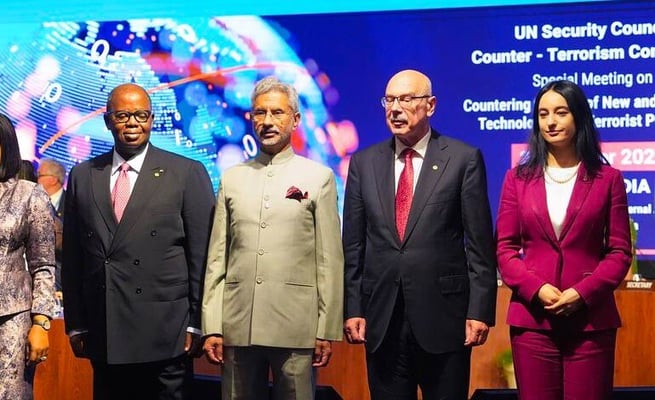Host India in limelight at counter-terror conclave as Pakistan is left out

The United Nations Security Council’s Counter-Terrorism Committee (CTC) meeting held in India last week was a landmark event on two key counts.
First, India was hosting the event for the first time. This provided the platform to raise concerns specific to India at a global forum.
Second, New Delhi seized the opportunity to focus international attention back on Pakistan’s stone-walling of counter-terrorism efforts by its inaction on prosecuting terrorists on its soil who were involved in the Mumbai attacks of 2008, as well as China’s abetment of Pakistan in this respect.
Indian External Affairs Minister S. Jaishankar and US Secretary of state Antony Blinken both accused China of blocking moves to designate as terrorists individuals on the UNSC 1267 terror list.
The meeting heard Minister Jaishankar rightly identify terror financing as the source of oxygen for global terrorism.
Jaishankar told the audience, who included British Foreign Secretary James Cleverley, the foreign secretaries of Gabon and Ghana and junior foreign ministers from the UAE and Albania, that the key conspirators and planners of the 26/11 Mumbai attacks continued to remain protected.
Jaishankar used the diplomatic event to take an undiplomatic swipe at the UN. When it came to proscribing some of those terrorists, the Security Council “has regrettably been unable to act in some cases because of political considerations.”
Indeed, the “collective credibility and collective interests” of the international community were at stake at the two-day meet.
The meeting came at a moment when the world community appeared to have become inured to the reality of global terrorism.
In that sense, the Delhi Declaration, the document that emerged from the conclave, should effectively shake the international community out of its stupor.
The document, which is non-binding, creates a template for member states to follow in the areas of “countering the terrorist exploitation of Information and Communications Technology, payment technologies and fund raising methods and unmanned aerial systems ( UAS or drones).”
The document also stipulates the implementation of all relevant Security Council resolutions on countering the use of technologies for terrorist purposes, as well as the digital terrorism threat.
It calls on member states to “commit to deepening engagement and cooperation with civil society, including women and women’s organisations, relevant private-sector entities, and other stakeholders, and build relationships.”
Given the uninspiring track history of the Security Council in conflict resolution around the globe, the Delhi Declaration appears to be destined for the growing stockpile of unenforced Security Council resolutions.
Nevertheless, that did not stop the CTC chairperson, Ambassador Ruchira Kamboj of India, from declaring that the “ global policymaking community must be agile, forward-thinking, and collaborative” to meet the changing needs of States facing new challenges from digital terror.
The Counter-Terrorism Committee was established as per Security Council Resolution 1373, which was adopted unanimously on 28 September 2001 in the wake of the 9/11 terror attacks in the US. The Committee comprises all 15 Security Council members. Of these, there are five permanent and 10 non-permanent members, elected for two-year terms by the UN General Assembly. The permanent members include China, France, the Russian Federation, the UK and the US.
India has been actively lobbying for permanent membership of the UN Security Council.
The United Nations Security Council’s Counter-Terrorism Committee (CTC) meeting held in India last week was a landmark event on two key counts.
First, India was hosting the event for the first time. This provided the platform to raise concerns specific to India at a global forum.
Second, New Delhi...
The United Nations Security Council’s Counter-Terrorism Committee (CTC) meeting held in India last week was a landmark event on two key counts.
First, India was hosting the event for the first time. This provided the platform to raise concerns specific to India at a global forum.
Second, New Delhi seized the opportunity to focus international attention back on Pakistan’s stone-walling of counter-terrorism efforts by its inaction on prosecuting terrorists on its soil who were involved in the Mumbai attacks of 2008, as well as China’s abetment of Pakistan in this respect.
Indian External Affairs Minister S. Jaishankar and US Secretary of state Antony Blinken both accused China of blocking moves to designate as terrorists individuals on the UNSC 1267 terror list.
The meeting heard Minister Jaishankar rightly identify terror financing as the source of oxygen for global terrorism.
Jaishankar told the audience, who included British Foreign Secretary James Cleverley, the foreign secretaries of Gabon and Ghana and junior foreign ministers from the UAE and Albania, that the key conspirators and planners of the 26/11 Mumbai attacks continued to remain protected.
Jaishankar used the diplomatic event to take an undiplomatic swipe at the UN. When it came to proscribing some of those terrorists, the Security Council “has regrettably been unable to act in some cases because of political considerations.”
Indeed, the “collective credibility and collective interests” of the international community were at stake at the two-day meet.
The meeting came at a moment when the world community appeared to have become inured to the reality of global terrorism.
In that sense, the Delhi Declaration, the document that emerged from the conclave, should effectively shake the international community out of its stupor.
The document, which is non-binding, creates a template for member states to follow in the areas of “countering the terrorist exploitation of Information and Communications Technology, payment technologies and fund raising methods and unmanned aerial systems ( UAS or drones).”
The document also stipulates the implementation of all relevant Security Council resolutions on countering the use of technologies for terrorist purposes, as well as the digital terrorism threat.
It calls on member states to “commit to deepening engagement and cooperation with civil society, including women and women’s organisations, relevant private-sector entities, and other stakeholders, and build relationships.”
Given the uninspiring track history of the Security Council in conflict resolution around the globe, the Delhi Declaration appears to be destined for the growing stockpile of unenforced Security Council resolutions.
Nevertheless, that did not stop the CTC chairperson, Ambassador Ruchira Kamboj of India, from declaring that the “ global policymaking community must be agile, forward-thinking, and collaborative” to meet the changing needs of States facing new challenges from digital terror.
The Counter-Terrorism Committee was established as per Security Council Resolution 1373, which was adopted unanimously on 28 September 2001 in the wake of the 9/11 terror attacks in the US. The Committee comprises all 15 Security Council members. Of these, there are five permanent and 10 non-permanent members, elected for two-year terms by the UN General Assembly. The permanent members include China, France, the Russian Federation, the UK and the US.
India has been actively lobbying for permanent membership of the UN Security Council.









Leave a Comment